
Elizabeth, Princess Bibesco was an English socialite, actress and writer between 1921 and 1940. She was the daughter of H. H. Asquith, the British Prime Minister, and the writer Margot Asquith, and the wife of Antoine Bibesco, a Romanian prince and diplomat. She drew on her experience in British high society in her work. A final posthumous collection of her stories, poems and aphorisms was published under the title Haven in 1951, with a preface by Elizabeth Bowen.
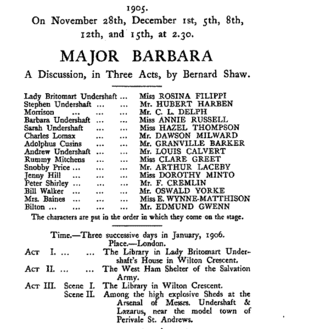
Major Barbara is a three-act English play by George Bernard Shaw, written and premiered in 1905 and first published in 1907. The story concerns an idealistic young woman, Barbara Undershaft, who is engaged in helping the poor as a Major in the Salvation Army in London. For many years, Barbara and her siblings have been estranged from their father, Andrew Undershaft, who now reappears as a rich and successful munitions maker. The father gives money to the Salvation Army, which offends Barbara because she considers it "tainted" wealth. The father argues that poverty is a worse problem than munitions and claims that he is doing more to help society by giving his workers jobs and a steady income than she is doing by giving people free meals in a soup kitchen.

The Man of Destiny is an 1897 play by George Bernard Shaw, set in Italy during the early career of Napoleon. It was published as a part of Plays Pleasant, which also included Arms and the Man, Candida and You Never Can Tell. Shaw titled the volume Plays Pleasant in order to contrast it with his first book of plays, Plays Unpleasant.
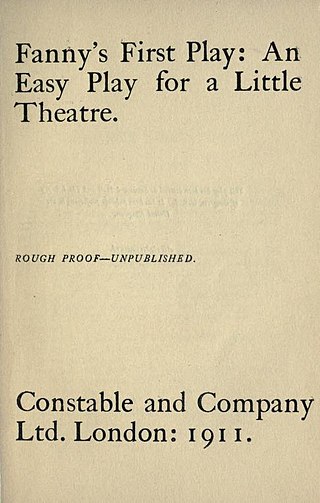
Fanny's First Play is a 1911 play by George Bernard Shaw. It was first performed as an anonymous piece, the authorship of which was to be kept secret. However, critics soon recognised it as the work of Shaw. It opened at the Little Theatre in the Adelphi in London on 19 April 1911 and ran for 622 performances. The mystery over the authorship helped to publicise it. It had the longest run of any of Shaw's plays. A second production opened on Broadway on September 16, 1912 for 256 performances. The play toured the provinces in England in the same year.

Archibald Henderson was an American professor of mathematics who wrote on a variety of subjects, including drama and history. He is well known for his friendship with George Bernard Shaw.
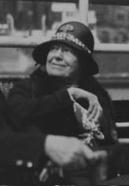
Charlotte Frances Payne-Townshend was an Irish political activist in Britain. She was a member of the Fabian Society and was dedicated to the struggle for women's rights. She married the playwright George Bernard Shaw.
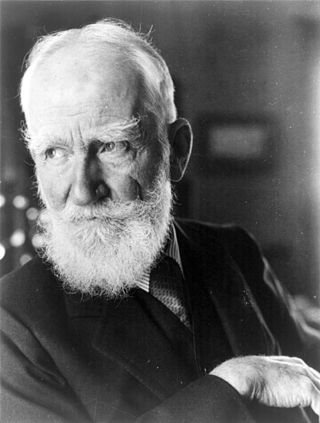
Getting Married is a play by George Bernard Shaw. First performed in 1908, it features a cast of family members who gather together for a marriage. The play analyses and satirises the status of marriage in Shaw's day, with a particular focus on the necessity of liberalising divorce laws.

How He Lied to Her Husband is a one-act comedy play by George Bernard Shaw, who wrote it, at the request of actor Arnold Daly, over a period of four days while he was vacationing in Scotland in 1904. In its preface he described it as "a sample of what can be done with even the most hackneyed stage framework by filling it in with an observed touch of actual humanity instead of with doctrinaire romanticism." The play has often been interpreted as a kind of satirical commentary on Shaw's own highly successful earlier play Candida.

Too True to Be Good (1932) is a comedy written by playwright George Bernard Shaw at the age of 76. Subtitled "A Collection of Stage Sermons by a Fellow of the Royal Society of Literature", it moves from surreal allegory to the "stage sermons" in which characters discuss political, scientific and other developments of the day. The second act of the play contains a character based on Shaw's friend T. E. Lawrence.

Village Wooing, A Comedietta for Two Voices is a play by George Bernard Shaw, written in 1933 and first performed in 1934. It has only two characters, hence the subtitle "a comedietta for two voices". The first scene takes place aboard a liner, and the second in a village shop. The characters are known only as "A" and "Z".

The Shewing-Up of Blanco Posnet: A Sermon in Crude Melodrama is a one-act play by George Bernard Shaw, first produced in 1909. Shaw describes the play as a religious tract in dramatic form.

The Simpleton of the Unexpected Isles: A Vision of Judgement is a 1934 play by George Bernard Shaw. The play is a satirical allegory about an attempt to create a utopian society on a Polynesian island that has recently emerged from the sea.
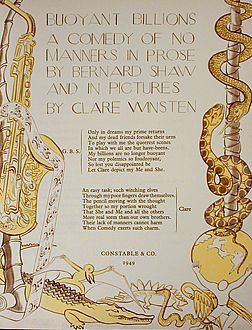
Buoyant Billions (1948) is a play by George Bernard Shaw. Written at the age of 92, it was his last full-length play. Subtitled "a comedy of no manners", the play is about a brash young man courting the daughter of an elderly billionaire, who is pondering how to dispose of his wealth after his death, a subject that was preoccupying Shaw himself at the time.

Geneva, a Fancied Page of History in Three Acts (1938) is a topical play by George Bernard Shaw. It describes a summit meeting designed to contain the increasingly dangerous behaviour of three dictators, Herr Battler, Signor Bombardone, and General Flanco.

The Music Cure, a Piece of Utter Nonsense (1913) is a short comedy sketch by George Bernard Shaw, satirising therapeutic fads of the era and the Marconi scandal of 1912.

Overruled (1912) is a comic one-act play written by George Bernard Shaw. In Shaw's words, it is about "how polygamy occurs among quite ordinary people innocent of all unconventional views concerning it." The play concerns two couples who desire to switch partners, but are prevented from doing so by various considerations and end up negotiating an ambiguous set of relationships.

The Glimpse of Reality, A Tragedietta (1909) is a short play by George Bernard Shaw, set Italy during the 15th century. It is a parody of the verismo melodramas in vogue at the time. Shaw included it among what he called his "tomfooleries".

Press Cuttings (1909), subtitled A Topical Sketch Compiled from the Editorial and Correspondence Columns of the Daily Papers, is a play by George Bernard Shaw. It is a farcical comedy about the suffragettes' campaign for votes for women in Britain. The play is a departure from Shaw's earlier Ibsenesque dramas on social issues. Shaw's own pro-feminist views are never articulated by characters in the play, but instead it ridicules the arguments of the anti-suffrage campaigners.

The Interlude at the Playhouse (1907) is a short comic sketch written by George Bernard Shaw to be delivered by Cyril Maude and his wife Winifred Emery as a curtain raiser at the opening of The Playhouse, a newly renovated theatre managed by Maude. The sketch was performed on Monday, 28 January 1907.

The Gadfly or The Son of the Cardinal (1897-8) is a dramatic adaptation by George Bernard Shaw of Anglo-Irish writer Ethel Lilian Voynich 's novel The Gadfly. It was written as a favour to the author, who was a friend of Shaw's.









